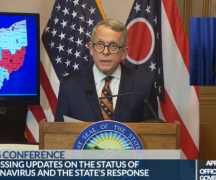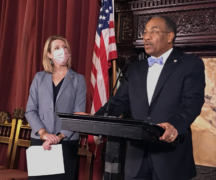By Susan Tebben
A new database is up and running to get Ohioans scheduled for COVID-19 vaccinations, but another issue facing those wanting the shot is getting there.
Ohio Gov. Mike DeWine announced the launch of a centralized scheduling tool that he says will streamline the process. The state is still working to get providers connected to the site.
Local agencies are hearing concerns from residents about not only getting a COVID-19 vaccination appointment through the many different providers and means of scheduling appointments, but also transportation to get to the appointment.
The Franklin County 211, an information service that provides free information for everything from finding domestic violence shelters and food pantries to tax preparation services, had to build up a database of resources to answer questions about the COVID-19 pandemic, but don’t get many calls about the vaccination itself.
“It’s less about vaccines, but more about transportation,” said Sue Villilo, assistant vice president of community based services for Lutheran Social Services, the non-profit who runs Franklin County 211.
Villilo, who has a background as a social worker, said those looking for help amid the pandemic have anxieties that extend far beyond the vaccine, such as food assistance and affordable housing.
“It’s a crisis on top of a crisis,” Villilo said. “It’s probably more important than ever that people have access to these services.”
The Health Policy Institute of Ohio looked at the impact of transit and health equity, finding that 23% of Black women in the state live in households without a vehicle. Data from the Ohio Medicaid Assessment Survey showed that 28% of Appalachian Ohio residents 75 and over delayed or avoided getting health care due to a lack of transportation.
Not only does transportation access affect COVID-19 health care access, but things like prenatal care, mental health and nutritional options.
“Transportation access is critical for good health across the lifespan,” HPIO wrote in a recent fact sheet.
An assessment of what is needed in Ohio to protect the state from COVID-19 spread and reduce health disparities beyond the pandemic was done by the Ohio State University. It identified the barriers and needs of different populations within Ohio who “are at risk for disproportionate burdens of disease and death during the COVID-19 pandemic,” including Black and African American, Latino and Hispanic, Asian and Asian American, immigrant and refugee and rural communities, along with those with disabilities.
Currently, 8% of Ohio’s Black/African American population has started their COVID-19 vaccination, according to state data. Only 4% of Blacks in Ohio have completed the vaccination process. Race data is provided on a voluntary basis by those receiving the vaccine. The second and third biggest race groups reported by the state are listed as “unknown” and “other.”
State data shows 17% of the state’s overall population have started the vaccination.
The OSU study found a lack of personal transportation to be one of the “substantial barriers” to public health and recommended improved public and shared transportation services as a “top-level” need among high-risk populations.
Specifically, the study recommended improving the public transportation infrastructure “by adding routes that go to testing and healthcare sites, increasing the frequency of routes, and reducing the cost to riders.”
The Ohio Department of Medicaid said individuals enrolled in Managed Care Organizations, such as Aetna, Buckeye Health Plan, CareSource, Molina Healthcare, Paramount Advantage and United Healthcare, can get transportation support to and from a COVID-19 testing or vaccination site though county departments of Job and Family Services agencies.
“Typically, MCO transportation should be scheduled at least 48 hours in advance of your appointment and can be made up to 30 days in advance of your travel date,” according to the state department of Medicaid.
***
Also from Ohio Capital Journal:
Bill to let legislators strike down health orders advances to House floor
With vaccinations ramping up and Ohio’s governor having announced the metrics for dropping all public health orders, Republicans in the Statehouse are still advancing legislation meant to target the executive branch’s pandemic authority.
A bill to give lawmakers the power to strike down health orders they disagree with advanced Tuesday to the House chamber, where the Republican majority is expected to pass the bill on Wednesday.
Senate Bill 22 already passed the Ohio Senate last month. The bill’s Republican sponsors have characterized the bill as being designed to ensure checks and balances between the branches of government during any future public health crisis. Other bill supporters in the legislature see it as a necessary response to a governor whose pandemic response has been, in their view, too heavy-handed and not open enough to the ideas of state lawmakers.
Public health officials have spoken out against the legislation.
The bill seeks to limit how long a public health state of emergency can last, with the Ohio General Assembly able to extend it as desired. READ MORE
Bill removing duty to tell cops about concealed weapons advances
Republicans on a state House committee passed legislation Tuesday removing a requirement for licensed Ohioans to notify police that they’re carrying a concealed handgun or have one in the vehicle.
Under House Bill 89, the CCW (concealed carry) licensees would only need to inform police about a weapon if the officer in question asks. Only at that point would they be required by law to show their CCW license and disclose that they’re carrying or have a weapon in the vehicle.
The bill also removes the penalty for violating this requirement. Under current law, failing to “promptly inform” an officer about a weapon in the car is generally a first-degree misdemeanor and a suspended CCW license.
Law enforcement groups like the Buckeye State Sheriffs’ Association, the Fraternal Order of Police, and similar entities all opposed the idea.
“By reducing the requirement [to notify], this amendment could serve to create the tense situations that have led to an erosion of the public’s trust in law enforcement,” said Bruce Pijanowski, the Delaware Chief of Police, on behalf of the Ohio Association of Chefs of Police.
“At a time where we’re asking law enforcement to deescalate and where demands for reform are being heard loud and clear, why would we legislatively create a situation that can result in escalation?” READ MORE





